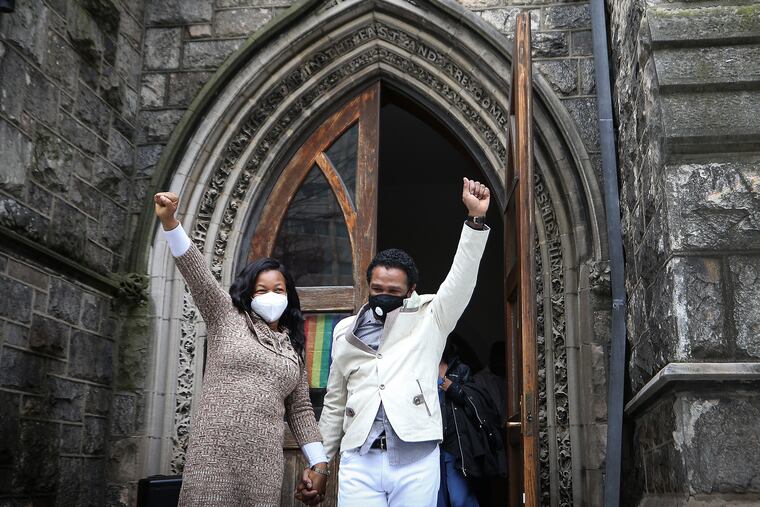Undocumented Jamaican couple celebrate freedom after more than two years in Philly church sanctuary
Clive and Oneita Thompson half-stepped, half-danced from the stone steps of a Philadelphia church on Monday, walking — free from the threat of deportation — into a crowd of supporters.

Clive and Oneita Thompson half-stepped, half-danced from the stone steps of a Philadelphia church on Monday morning, ending more than two years in sanctuary and walking — free from the threat of deportation — into a cheering community of friends, clergy and supporters.
Smiling and pumping their fists, the undocumented Jamaican couple were met by applause, whistles, bells, tambourines, and noisemakers at a socially distanced celebration outside the Tabernacle United Church in University City.
Oneita’s voice caught on Monday as she described their time inside church walls, never knowing whether government-ordered removal would separate her and her husband from their seven children, all of whom are citizens or live legally in the United States.
“I was very fearful of losing my children,” she said. “I was very fearful of losing the will to fight. ... I turned to the Bible.”
The Thompsons spent 843 days in sanctuary, more than half of President Donald Trump’s term in office. The federal government agreed to drop its deportation case against them, enabling them to pursue permanent residency in the U.S., a process currently underway.
The news that their time in sanctuary was ending, first reported by The Inquirer on Sunday, marks a dramatic end, and a new beginning, to the saga of a family that fled Jamaica in 2004 after gang members burned their farm and threatened to kill them.
The U.S. government denied them asylum but allowed them to stay. For 14 years, the Thompsons worked, paid taxes, and raised their children in the tiny Cumberland County community of Cedarville. Then the Trump administration took power and moved to deport them.
It was not clear why the administration, having denied the couple’s every entreaty, suddenly agreed to change course. U.S. Immigration and Customs Enforcement officials had no immediate comment.
Oneita, 48, and Clive, 61, will soon return to their South Jersey home and the lives they left behind in August 2018. The transition from sanctuary to community typically can take weeks, as belongings are packed and moved.
On Monday, the winter wind blew and the temperatures bit — but no one outside the church seemed to feel it. Four days before Christmas, speakers gave thanks to God and praised the family’s resolve.
“God chose them,” said the Rev. Christopher Neilson, who is close to the Thompsons. “And because he chose them, he took them through many trials. But the fire did not burn them. ... He has set them free.”
Those gathered — holding signs that said, “Hallelujah, Freedom for Clive and Oneita” and “Finally Free” — can “let the world know a miracle has happened here in Philadelphia,” Neilson said.
Peter Pedemonti, co-director of New Sanctuary Movement of Philadelphia, which has supported the family from the start, and the Rev. Katie Aikins of Tabernacle both said that the fight for immigrant justice continues.
“There’s another family a couple miles from here that’s still in sanctuary,” Pedemonti noted.
This month marks two years behind church walls for Carmela Apolonio Hernandez and her four children, of Mexico, who currently live at the Germantown Mennonite Church.
The Thompsons’ situation gained national attention as a drama that pitted a hardworking, God-loving couple against an administration bent on deporting all who lack official permission to be here.
Clive was a heavy-equipment operator at Bridgeton-based Cumberland Dairy, while Oneita, a certified nursing assistant, worked at Friends Village retirement home in Woodstown.
Only days before their scheduled deportation, Clive, Oneita, and their two youngest American-citizen children, Christine, 18, and Timothy, 14, took sanctuary in the First United Methodist Church of Germantown. They spent two years there. But relations with the church grew strained, and in September 2020, the family moved to Tabernacle church.
The Thompsons and New Sanctuary Movement said the Newark Office of the Principal Legal Advisor, which represents ICE in removal proceedings, joined the family’s motion before the Board of Immigration Appeals to reopen the deportation case — and then terminate it.
With deportation proceedings at an end, the Thompsons are eligible to legally live and work in this country through the connection to their daughter Angel, who became an American citizen in May. She filed what’s called an I-130, a “Petition for an Alien Relative,” which allows qualified relatives to settle here.
The goal of sanctuary is to buy time, for legal cases to go forward, for advocates to generate pressure, for elections to change the direction of government.
But for the undocumented immigrants inside church walls — currently about 40 people in 16 states — the world shrinks. The early excitement of climactic battle fades, and the days grow long. Depression can be common. The isolation can be overwhelming.
Philadelphia has been the site of four major sanctuary cases during the last four years, and the tactic has so far been successful in three.
“What Advent joy, what Christmas joy,” Aikins told those outside Tabernacle United. “The yoke of the burden of deportation has been broken. ... Even though we love this church, you don’t want to sleep in here all the time.”